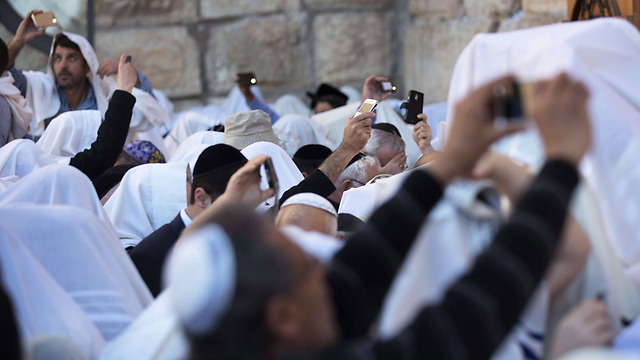
'Everyone is free to choose their own Judaism'
Is Judaism an inseparable part of Israeli culture, and does everyone have the right to decide what their own Jewishness would look like?
In the beginning God created the heaven and the earth. Now the earth was unformed and void, and darkness was upon the face of the deep; and the spirit of God hovered over the face of the waters. And God said: 'Let there be light.' And there was light. And God saw the light, that it was good; and God divided the light from the darkness. (Genesis, 1:3-5)
Since the world was created – each with their own belief as to how it happened – many waters have swept through the rivers, the lands have shifted and light took the form of a light bulb that could be turned on and off on demand. But not only the environment changed – many different branches in Judaism proved how accurate the phrase "to each his own belief" is. The phrase notes that every person has the right to live according to their views, as long as they do not harm others, of course.
In recent months there were many campaigns in Israel aimed at getting Israelis closer to Judaism, whether to Judaism as a religion or Judaism as a culture. Some of the responses to the campaigns raised criticism about the attempts to teach things that are outdated and are not suited for everyone, and as a result, eventually, instead of getting closer, there is a larger disconnect.

"Every Jew in Israel, and in the entire world, has every right to feel part of the Jewish culture, which is his home and accepts him, whatever his views may be," says Dr. Motti Ze'ira, director of HaMidrasha at Oranim – an educational center that strives to renew Jewish life in Israel, while focusing on the education system, community and family. The goal of the Midrasha is to shape a society in which there is mutual understanding, a social responsibility and a warm human contact.
"No one can determine what Judaism is," says Ze'ira. "Everyone has the freedom to choose, as long as they invest in their beliefs and practice them with seriousness and dedication. I think that in light of what is happening here in the past two-three decades, there is no doubt that there is an awakening among the Israeli public to engage in the Jewish culture and not necessarily through the existing liberal and orthodox movements."
"I think there is a general inclination to return to the roots, but it is expressed in different ways," says Dr. Noah Hayut, the executive director of the Ya'akov Herzog Center and a Bible Studies lecturer.
"There are projects that perhaps are based on good intentions, but their advertisements provoke a lot of criticism, because suddenly people feel they are taken back to a time in which they were presented with only two extremes. There were two cultures in Israel – the religious-orthodox one that included the entire treasure of the Jewish culture and bookshelf, and the secular culture which has nothing. I don't think this initiative is bad, but it is performed with very insensitive tools, to say the least."
Ze'ira adds that there are additional voices calling for the return to Judaism, but incorrectly. "There is some sort of a takeover of the public space in terms of Jewish culture, but using the wrong tools. There is a kind of shallowness and disrespect towards what it is to be Jewish in Israel.
"There is a use of definitions that are no longer suitable for the modern Israeli; they use symbols whose meanings may be negative for the public, out of wrong assumptions that could be disrespectful. There is no need to separate between secular and religious people – there are plenty of seculars who perform Kabbalat Shabbat, and each has their own meaning regarding what is sacred and important in their opinion. This is the true meaning of Judaism as a culture, in my opinion."
"We need to make tradition more accessible to the population in a way that is not judgmental so that anyone could participate," adds Esteban Gottfried, director of Beit Tefilah Israeli – an organization that conducts Kabbalat Shabbat every week at the Tel Aviv Port. "In my opinion, a Shabbat with the family, having Shabbat dinner together, is as Israeli as it gets, and a trip on a Saturday morning is just as Israeli. We need to accept the fact that being Israeli has many different meanings."
Why is there a resistance, for example from the secular side, to all that has to do with Judaism?
"I think that Israelis should be given a wide range of options that fully cover everything that has to do with Judaism," says Ze'ira. The secular people need to understand that the choice is their own. There is quite a bit of ignorance when it comes to Judaism, and the big problem starts with secular people who allow those who represent the faith to create these 'Jewish templates'.
"It is the laziness and inferiority complex of people who abandon this arena to all those who seem somewhat religious and can say what Shabbat is to them. I think that many just give up in advance, for example, on having a Jewish wedding or meaningful Shabbat and pass on the responsibility over the discourse to those who determine what these things should look like.
"Within the framework of the Midrasha, we reach tens of thousands of people in the public sphere and we never say 'what you do is not worthy' or 'if you want to be Jewish you must do a Kiddush'. We connect with the people and their biographies, we help them pour meaning into what is Jewish in their view, like, for example, helping new Israeli communities anywhere to have their own Kabbalat Shabbat and observe the holidays – all based on the recognition of others and respect for them."
"We must respect the wishes of every person as well as their ability to choose the right way to connect to their own Jewish roots," emphasizes Dr. Hayut. "There are other projects that were meant, for example, to create a culture of mutual reading and learning, with the very modern tools of new media. It creates an amazing buzz that allows people to have the comfortable opportunity to turn back to the bible and reach a more intimate acquaintance with the bible, including with its less familiar parts. This is a successful example that is gaining momentum and is integrating well within the Israeli society."

Eran Baruch, director of BINA – an organization that was established in order to create a bond between the secular Israeli society to the Jewish culture – thinks that there is a deeply rooted conception among both the secular and the religious crowds, that states that only those who are religious understand Judaism and that there is only one kind of Judaism. "The role of those who are religious is to teach those who are secular. And the seculars, who are 'ignorant' in the world of Judaism, and are comfortable in their state of ignorance, go straight to an orthodox rabbi whenever they need to learn something. In my opinion, it needs to be the complete opposite.
"The secular crowd should be taught by their own about Judaism, and each person should be part of their community the way they see fit. I think that I, as someone who is secular, should come from a place of feeling familiar with the religious sources and not from a place of inferiority. This way there isn't an artificial connection between me and someone who is religious, a connection that to me seems unclear, and because I don't have the information I should turn to a rabbi to have him explain it to me. In my opinion this is a state that people who are religious want. A state that keeps Judaism in the same place it is at now, instead of developing it for everybody.
"I am Jewish, and my Judaism is both Israeli and social, and as someone who is secular I feel that Judaism is the historic and cultural language of my homeland. I think that every Jewish man and woman, of any branch of Judaism, should be proactive and learn about Judaism, know Judaism and create Judaism in accordance with their worldview."
"To me, Judaism is values, it is tradition, family, and it is belonging, "says Ayelet Meridor, director of "Mirkam – an organization that represents integrated communities in which secular and religious residents live together. "That is the essence for me. It is the basis for my being, as well as my family's and all of Am Yisrael's."
Where is the new Jewish spirit everyone is feeling lately coming from?
Meridor: "My personal feeling is that there is a lot going on with that subject, a sort of an inner search that many people are experiencing. People have a desire for change and search for moral standards. There is a movement that is starting about because people, both secular and religious, are demanding their Judaism and are now interested in old and outdated rituals – they want something new that will give them meaning.
"Some of the recent campaigns address exactly that. They sense the winds of change and some of them are trying to use that. The problem is that many times the bottom line is not entirely connected to what is truly happening today. The attempts to make the campaign revolve around change come from old syndromes – and what turns out is that they try to do something good and it comes out wrong.
"A lot of social changes occur during a set period of time and they inevitably affect the society. It could be the wearing away of the defense narrative that has kept us together over the years, and was the foundation of our lives. Perhaps it is the story of economic strain, but either way, people are looking for the feeling of belonging and connecting.
"A lot of it comes from the fact that there is a will to search for common grounds, to find an answer to the question 'why do I want to stay here' – this is our home, and people want their home to be significant".
How do people react to the attempt to address recurring existential questions?
"This story repeats itself – when you address people out of respect, as equals, you learn no less than you teach, you listen no less than you tell," says Dr. Hayut. "There is an interesting and pleasant dialogue and when you come from a level of preaching or do so scornfully, which is even worse, the reactions would be different.
"I think that generally there is something refreshing about the Israeli society when it comes to Jewish culture, and it needs to be given the tools to develop and grow, but this process is very fragile and it needs to be dealt with caution and respect in order to be fruitful."
"We are working proactively to establish communities from all parts of the Jewish culture that live together and show responsibility and mutual respect," says Meridor. "People are looking for meaning, a Jewish meaning that is, as well as a communal meaning. It is a search for an answer for the personal question – 'where am I not alone'. The individual story slowly fades and the emphasis comes back to something that revolves around the community.
"In my opinion, it stems from the ground. There are secular people who come forward and seek meaning, and they say, 'I have values that sit together with Jewish values, and in order to preserve them I want to be part of the rituals and help conserve them'.
"At the same time, there is a group of religious people who say, 'I have rituals that I do all the time, but I want to go back and find out about the origins of their value'. And then everyone comes together and each person gives his own take and we see new models of a valuable life and they also allow the preserving of these rituals."










